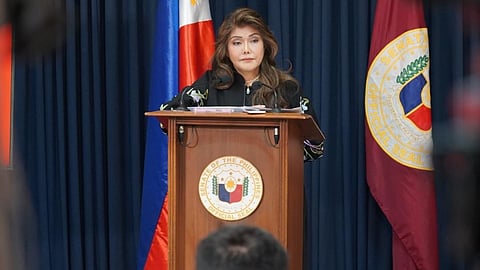
- NEWS
- the EDIT
- COMMENTARY
- BUSINESS
- LIFE
- SHOW
- ACTION
- GLOBAL GOALS
- SNAPS
- DYARYO TIRADA
- MORE

Senator Imee Marcos on Tuesday said the arrest of former President Rodrigo Duterte last month was “politically motivated” and part of a whole-of-government effort to bring down the Dutertes.
Citing the additional findings of the Senate Committee on Foreign Relations’ investigation into Duterte’s arrest, Senator Marcos highlighted the “clear pattern” of politically charged incidents directly preceding key statements and decisions made by the administration with regard to the International Criminal Court (ICC).
Sought for comment, President Ferdinand Marcos Jr. flatly dismissed the claims.
“Everyone is entitled to their opinion; I disagree,” the President said in an ambush interview in Silang, Cavite.
Senator Marcos pointed to the foiled People’s Initiative (PI) as the administration’s first “clear attempt” to shut down the Duterte family’s chances in the 2028 presidential elections.
“The very first clear attempt to bring down the Dutertes was the PI which would have served as a prelude to the revision of the political provisions in the Constitution in order to prevent the Dutertes from regaining the presidency in 2028,” she said.
“When the PI failed, the administration scrambled to destroy the Duterte name and to remove the family’s patriarch, FPRRD, from the country,” she said.
The PI, believed to have been pushed by the House of Representatives, was marred by controversy following allegations government funds were used to pay off people to sign petitions calling for Charter change.
As early as May 2024, Senator Marcos said the House of Representatives, led by her cousin Speaker Martin Romualdez, was already “attacking FPRRD by attempting to link extrajudicial killings to him.”
She noted that ICC personnel arrived in the country in October 2024 and were assisted by the government in securing documents necessary to obtain an arrest warrant for the former president.
Senator Marcos said the second attempt was the investigation by the House into the alleged misuse of confidential funds by the Office of the Vice President headed by Duterte’s daughter, Vice President Sara Duterte.
“Since VP Sara would be a threat in 2028 even without FPRRD, the House of Representatives conducted investigations into the OVP’s confidential funds and eventually impeached her,” she said.
On 5 February 2025, a total of 215 lawmakers, or more than two-thirds of the House of Representatives membership, signed the resolution to impeach Duterte.
The Senate has yet to convene the impeachment court to try Duterte. Senate President Francis “Chiz” Escudero said the upper chamber will convene as an impeachment court on 30 July despite calls to act immediately on the complaints.
‘Since VP Sara would be a threat in 2028 even without FPRRD, the House of Representatives conducted investigations into the OVP’s confidential funds and eventually impeached her.‘
To convict Duterte, at least two-thirds of the 23 sitting senators — a minimum of 16 votes — will be required.
Senator Marcos also referred to documents titled “Mid-Election Final Campaign Sprint Action Plan” (Action Plan) of the majority Lakas-CMD party as evidence that the arrest and turnover of Rodrigo Duterte to the ICC was politically motivated.
“Dated 22 April 2025, the Action Plan outlines in detail the accomplishments of ‘Oplan Horus,’ an operation launched in April 2024 aimed at bringing down the Dutertes,” she said.
In the “How to Attack” section of the Action Plan, various government agencies, including the Philippine National Police and the House of Representatives, were said to have collaborated with former Senator Antonio Trillanes to assist the ICC Prosecutor in securing an arrest warrant for FPRRD, Marcos said.
“The Action Plan also revealed that the votes needed to impeach Vice President Sara in the House of Representatives were secured through the use of ‘soft’ projects like AICS, AKAP and TUPAD,” she said.
Marcos noted that the document also suggested the impeachment of the Vice President should be expedited, with the needed Senate votes exchanged for “For Later Release” projects as a reward.
Senator Marcos also accused her brother’s administration of orchestrating a “coordinated attempt” to cover up the details and motivations behind the arrest of the former president.
She pointed out the use of executive privilege by Interior and Local Government Secretary Jonvic Remulla when he was asked during the Senate hearing about the “group effort” by the administration to arrest Duterte.
Marcos also cited the sub judice rule as another tool used by the administration to block the Senate panel from fully investigating the events surrounding the arrest.
“One example was when General Nicolas Torre III made a misleading statement during the first hearing, claiming that he was rushing to deliver FPRRD to The Hague because of the reglementary period under Article 125 of the Revised Penal Code,” she said.
“When confronted with the fact that Article 125 only applied to warrantless arrests, General Torre, on the advice of the DoJ, suddenly invoked the sub judice rule,” she pointed out.
Marcos also noted the “blanket use” of executive privilege by Executive Secretary Lucas Bersamin to prevent executive branch officials from attending the Senate panel’s second hearing.
“The cover-up didn’t end with the hearings,” she said. “After the arrest of FPRRD, pro-Duterte sentiments surged, while the administration’s trust rating plummeted.”
She added: “The committee received information from a reliable source that the administration launched a communication plan to divert the public’s attention from the arrest and transport of FPRRD to issues like the West Philippine Sea and alleged disinformation activities by China.”
The senator was referring to claims that China was interfering in the upcoming May midterm elections by supporting pro-China candidates.
Duterte was arrested on 11 March at Ninoy Aquino International Airport upon returning from Hong Kong. He was flown later the same day to The Hague, Netherlands, where the International Criminal Court is based and where he remains in its custody.
